
Quick Navigation
- Allergies Explained
- Types of Allergies
- Symptoms of Allergies
- How Allergies Can Cause Joint Pain
- What Joints Can Be Affected by Allergies?
- How Food Allergies Are Linked to Joint Pain
- How Seasonal Allergies Are Linked to Joint Pain
- Tips to Manage Allergies and Joint Pain
- Contact OrthoBethesda
If you suffer from allergies, you likely know the toll they can take on your sinuses. But what about the rest of your body? Can allergies affect joint pain? Believe it or not, allergies, whether seasonal or food-related, can affect joint pain. Allergy symptoms appear for a variety of reasons, but some symptoms — like joint pain — may occur because of the humidity and rapid temperature changes that accompany the spring season.
During allergy season, many individuals experience a spike in allergy symptoms, particularly when there is a high pollen count. Some individuals will have mild symptoms like a stuffy nose and sneezing.
Others, on the other hand, can experience pain in their neck, back and joints. Joint pain is widespread. A national survey showed one-third of adults claimed to have experienced joint pain within the previous 30 days.
Allergies Explained
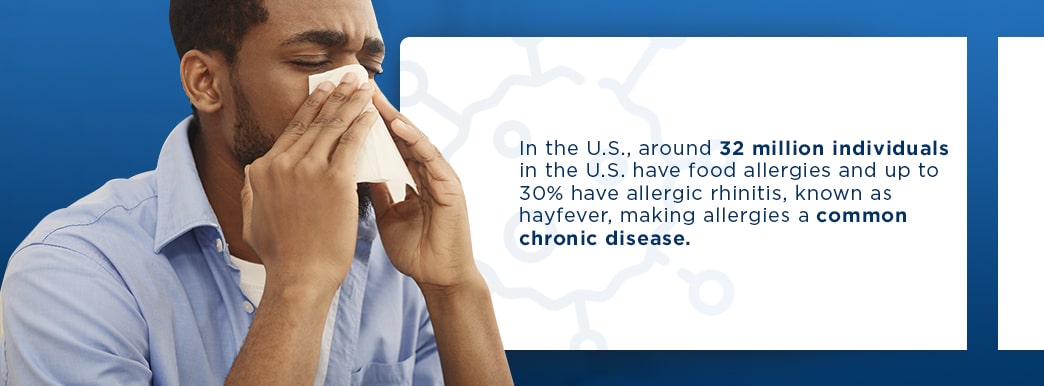
In the U.S., around 32 million individuals in the U.S. have food allergies and up to 30% have allergic rhinitis, known as hayfever, making allergies a common chronic disease. A chronic disease is one that lasts over a long period or occurs frequently.
An allergy occurs when your immune system identifies a certain substance and overreacts to it. Substances that lead to an allergic reaction are known as “allergens.” When you have allergies, your immune system makes the immunoglobulin E (IgE) antibody, which responds to allergens. The allergic reaction results in symptoms.
Think of it as a result of “mistaken identity.” The allergen gets into your body, and your immune system wrongly identifies it as a dangerous substance. It then responds by making antibodies that attack the allergen. These antibodies are of the IgE class.
When your immune system finds the allergen, IgE antibodies begin triggering a flood of immune system reactions, which include the release of mast cell chemicals (substances your body typically uses for destroying microorganisms). Histamine is the most common of these chemicals. Histamine, in small amounts, causes reddening and itching of the local area. In larger quantities, the neighboring blood vessels become dilated, causing the area to swell with accumulated fluid.
Doctors believe this overreaction of the immune system to a harmless substance is genetic. Doctors describe this genetic tendency as “atopy.” Doctors describe an individual with an allergy as being “atopic.” These individuals typically have raised IgE levels in their blood.
Types of Allergies
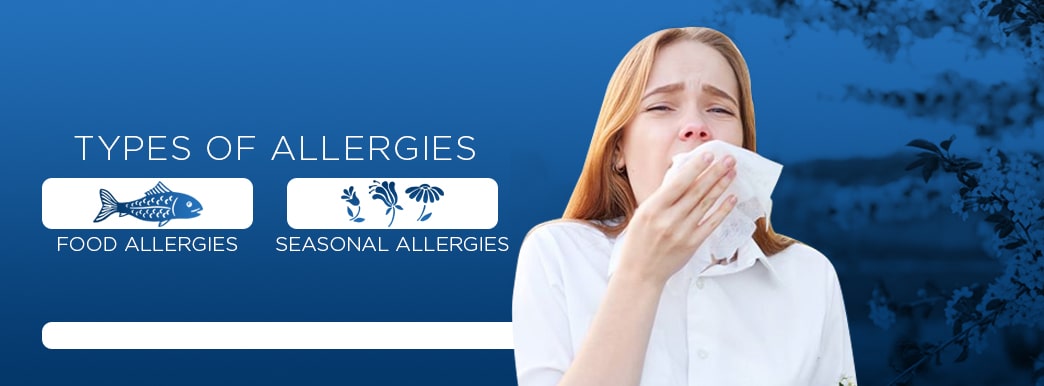
Two main types of allergies are:
- Food allergies: A food allergy occurs when your immune system mistakenly overreacts to a nondangerous food protein (an allergen). Common food allergens in the U.S. are soy, egg, milk, fish, shellfish, wheat, peanut and tree nuts.
- Seasonal allergies: These are your immune system’s response to pollen grains — plant sperm cells that float each spring in the air. By misinterpreting pollen as a health threat, your body starts triggering an inflammatory response, resulting in irritating symptoms like a runny nose and itchy eyes.
Allergies can lead to illness when you eat certain foods or breathe in or touch certain substances. When particles of pet dander, pollen or specific types of food enters your body, it’s called “antigens.” If your body has a sensitivity to that particle, it mistakes it for a dangerous invader. So, when you come in contact with an allergen, your entire system experiences inflammation, including your joints.
Allergens aggravate joint pain because they stimulate your immune system. People often ignore these symptoms, but they shouldn’t — doing so could be detrimental to the quality of their health.
Symptoms of Allergies
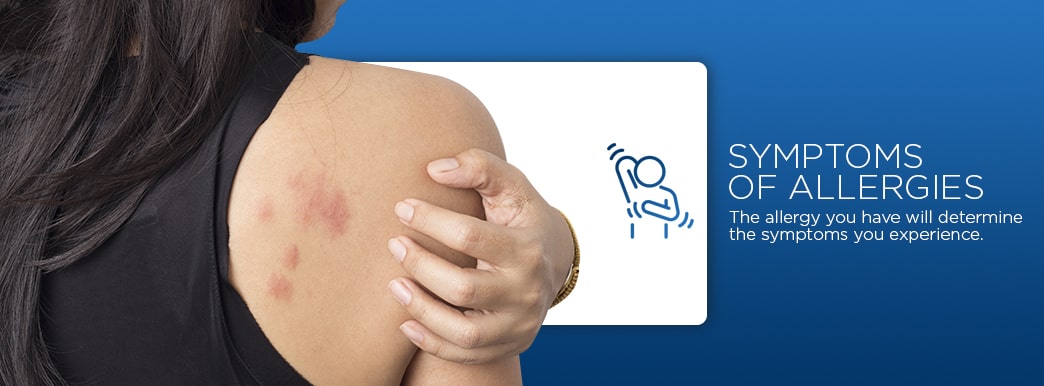
The allergy you have will determine the symptoms you experience. Symptoms may include:
- Runny nose
- Sneezing
- Breathing problems
- Swelling of your eyes, face and lips
- Headache
- Persistent cough or wheezing
- Watery, red and itchy eyes
- Stomach pains
- Skin rash
- A tightness of your throat and swelling of your tongue
- Vomiting and diarrhea
Because these symptoms can also occur with numerous other medical conditions, don’t self-diagnose. It’s essential that you make an appointment with your doctor if you’re experiencing any of the symptoms to receive a proper diagnosis and treatment.
How Allergies Can Cause Joint Pain
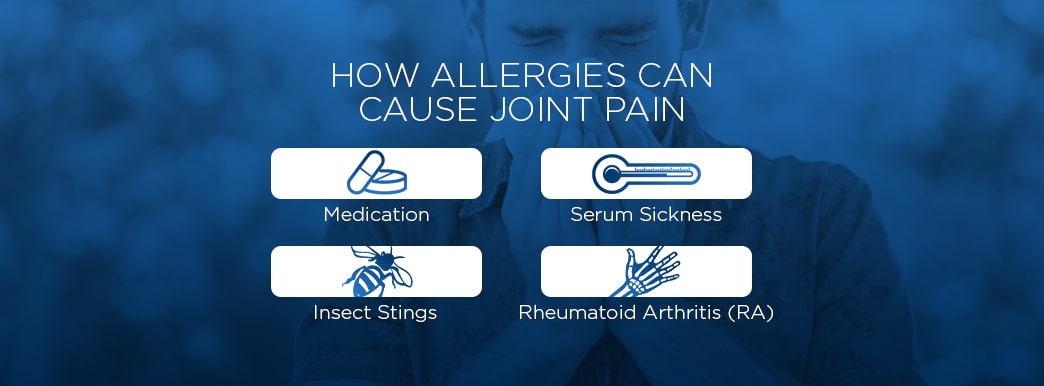
Allergic reactions come in various forms, including some that can lead to joint pain. Here are some of the ways allergies bring about joint pain:
1. Medication
Allergies to medications can cause symptoms of joint pain. Doctors classify medication-related allergic reactions based on the reaction they cause. Certain drugs cause an immediate type 1 allergic reaction. These reactions can cause symptoms like wheezing and urticaria. Another possible symptom is angioedema (swelling) which could occur at the area the medication came in contact with, including joints. Swelling can make moving your joints difficult.
2. Serum Sickness
This is a type 3 allergic reaction you can experience days or weeks after you had exposure to an allergen. Serum sickness symptoms include fever, hives, swollen glands and joint pain. With serum sickness, your immune system forms immune complexes in response to a foreign protein that causes inflammation and could deposit into your joints, causing pain.
3. Insect Stings
Insect stings frequently cause allergic reactions, including pain and swelling. While most individuals react to insect stings with swelling and pain, some individuals are allergic to the venom of insects. The reactions for these people go beyond a normal insect sting response and include symptoms like difficulty breathing, swelling of the tongue and face and nausea.
Insect stings don’t generally lead to serum sickness with joint pain. Because this is often a delayed reaction, you may have difficulty remembering the insect sting that triggered your reaction.
4. Rheumatoid Arthritis (RA)
Inflammation can occur with any allergy, and this can trigger a medical condition that involves joint pain like rheumatoid arthritis. RA is a type of autoimmune disease where your immune system mistakenly initiates an attack even with a lack of foreign substances. It leads to swelling and pain in your joints.
While RA’s exact causes aren’t known, case reports do show a link between food allergies and joint pain, particularly RA. The inflammation caused by food allergies could worsen or trigger RA.
What Joints Can Be Affected by Allergies?

Allergies can affect certain joints, including:
1. Shoulders and Knees
When thinking about food allergies, you probably don’t think knee and shoulder joint pain could be a symptom. For individuals who suffer from inflammatory joint conditions like arthritis, food allergies could cause inflammation, which results in a flare-up of pain. Anything that causes your immune system to react can trigger joint pain in different areas of your body, including your knees and shoulders.
2. Back
Over the past several decades, doctors have confirmed a co-occurrence of allergic conditions and back pain. Researchers listed allergy symptoms as “muscle tightness, low back pain and muscle pulling” with hamstring and nuchal muscle discomfort and sharp pain resembling sciatica pain.
3. Various Parts of the Body
Doctors working in the field of food allergy are knowledgeable with food’s ability to cause joint pain in numerous body parts. Food-allergic patients often suffer from joint and muscle pain of the back, chest, arms, abdomen, back of the neck and legs.
How Food Allergies Are Linked to Joint Pain

Can food allergies affect joint pain? Here’s an explanation of the link between joint pain and food allergies:
1. Inherited
Not only are seasonal allergies common in many individuals, but so are food allergies. However, sometimes people inherit allergies to specific types of food, and it’s hard to predict the condition among families. A family member could develop allergies to a specific type of food at any point in their lives.
2. Immune System
As mentioned, soy, fish, tree nuts, peanuts, shellfish, eggs and wheat are common allergy-causing foods in many individuals. The immune system overreacts to a particular type of food or its components. In these cases, it responds to the food’s proteins as harmful substances entering the body, like how toxins invade, leading to the overreaction that causes several symptoms. These symptoms include:
- Coughing
- Vomiting
- Wheezing
- Breathing problems
- Shock
- Weakened pulse
- Hives and hoarse throat
- Difficulty swallowing food
- Feeling faint
These symptoms typically impact the gastrointestinal, cardiovascular and respiratory systems. Food allergies could even lead to anaphylaxis — a life-threatening condition where you’re unable to properly breathe, resulting in shock. In these cases, joint pain occurs.
3. Inflammation
Allergens can trigger the immune system to produce inflammation, leading to joint pain in different areas of the body. This explains why patients with arthritis feel severe joint pain after they eat particular foods they’re allergic to.
How Seasonal Allergies Are Linked to Joint Pain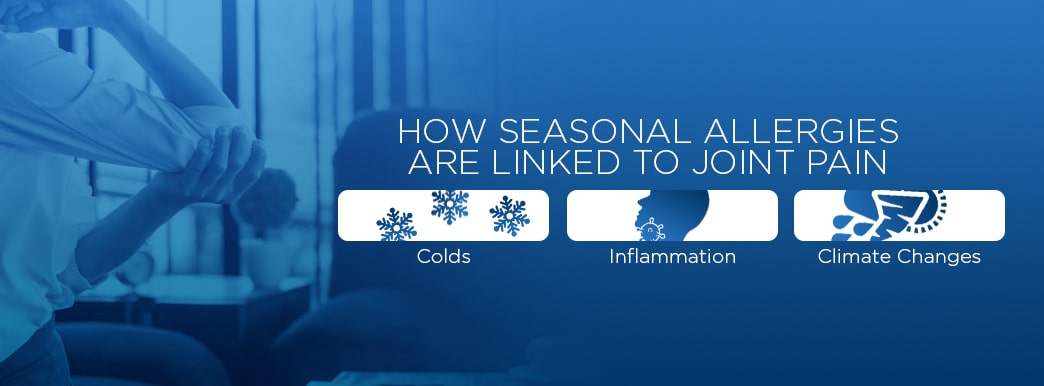
Seasonal allergies occur at certain periods of the year. These allergies typically impact various areas of the body, including the throat, eyes and nose. Joint pain typically accompanies these allergies.
However, there’s still the question about the link between seasonal allergies and joint pain. Here are some reasons:
1. Colds
Seasonal allergies often develop in the same way colds do, in that they’re characterized by itchy eyes, sore throats and running noses. But you may not recognize the difference between seasonal allergies and colds, since both manifest with joint pain. Therefore, you might directly link joint pain with seasonal allergies or colds until you take other symptoms into consideration.
When you have joint pain and a fever, it’s a sure sign of a cold. But when the joint pain develops along with a running nose, itching of the eyes and throat or sneezing, this indicates allergies.
2. Inflammation
Rarely do individuals link joint pain with allergies. However, when allergies bring on inflammation, the joint pain that follows is inevitable. The increased inflammation seasonal allergies bring on is due to your antibodies fighting the foreign allergens that cause the allergy. Your throat, nose and eyes experience inflammation as your immune system fights to ward off the allergens. Your body becomes exhausted from the pressure exerted on your immune system, and this could be what’s causing your joint pain.
3. Climate Changes
Joint pain can also develop because of changes in the climate from season to season — cold and damp climates, for example. Seasonal allergies, in this case, could indirectly cause joint pain. Seasonal allergies are generally heightened between March through early summer in the U.S.
Tips to Manage Allergies and Joint Pain
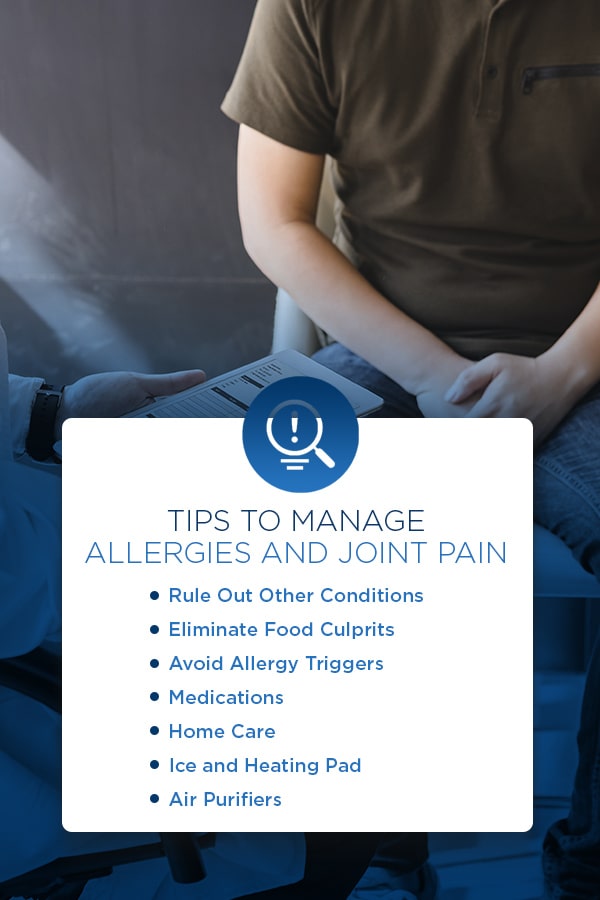
Here are some tips to help you manage allergies and the joint pain that often follows:
1. Rule Out Other Conditions
The first thing you should do is rule out any other underlying medical condition. If you believe your chronic joint pain is indeed allergy-related, speak with your doctor about treatment options that can alleviate your symptoms.
2. Eliminate Food Culprits
Eliminating substances and foods you’re allergic to is an effective way of reducing your allergy-related joint pain. Some symptoms of allergies don’t develop right away and could develop a day after you’ve eaten a certain food. Pinpointing the food that caused your joint pain can be difficult. For instance, if you have allergies to wheat, by the time your body absorbs the proteins, it could be hours before your joints become painful and inflamed.
Figuring out which foods you’re allergic to is the best treatment option and allergy-related joint pain preventive measure to take. Allergy tests and an elimination diet can help you figure out the foods you’re allergic to. A food elimination diet works by eliminating a certain food for several weeks and then re-introducing it to your body again to see if you react.
Allergy tests include blood and skin tests. A skin test uses small amounts of various food proteins the doctor injects under your top skin layer. After around 20 to 40 minutes, if you’re allergic to that food, you will likely develop a reaction. A blood test uses a sample of your blood to test for IgE antibodies.
3. Avoid Allergy Triggers
One essential thing you can do when you suffering from allergies is to figure out what the triggers are. While some individuals often blame a single trigger, it’s possible there could be more than one. It’s not uncommon for individuals suffering from spring allergies to experience symptoms all year ’round.
Some ways to avoid triggers include:
- Stay clear from exposing yourself to allergens such as cold and dampness.
- Take a shower after you’ve been outside.
- Monitor mold and pollen counts, which you’ll find in the news, on TV or online.
- Stay indoors during peak pollen counts — usually in the afternoons.
- Take preventive medicine.
- Wear a filter mask when you’re outdoors working.
- Shampoo your hair after being exposed to allergens
- Wash your bedding in soapy, hot water a minimum of once per week.
- Wear sunglasses to protect your eyes from pollen.
- Wear a face mask during high pollen days if you have severe allergies.
- Don’t line dry your clothing or bedding outdoors if there’s a high pollen count, since pollen could settle on these items.
4. Medications
Certain medications can help with both allergies and joint pain, including:
Over-the-Counter Medicines
If your swelling and joint pain are mild to moderate, an over-the-counter medication, like a nonsteroidal anti-inflammatory drug (NSAID) such as ibuprofen (Motrin, Advil) or aspirin or naproxen sodium (Aleve) could provide relief. If you’re only experiencing very mild pain and don’t have any swelling, acetaminophen (Tylenol) can help.
Take caution with these medications, though — especially if you consume alcohol, since high doses of NSAIDs can cause stomach problems like ulcers and bleeding and acetaminophen can cause liver damage.
Prescription Medicines
If you’re experiencing severe pain that NSAIDs don’t effectively relieve, your doctor might prescribe you a stronger prescription pain reliever like opioids. Only use these under your doctor’s medical advice, since opioids cause drowsiness and are addictive. They may also cause constipation.
Other drugs that could help alleviate your joint pain and allergies include:
- Muscle relaxants: These treat muscle spasms and you can use them combined with NSAIDs if necessary.
- Antiepileptic drugs and antidepressants: These interfere with pain signals.
- Antihistamines: These counterbalance the effects of the common allergen component histamine that causes allergy symptoms.
- Decongestants: For short-term use, these help minimize sinus discomfort and swelling by thinning your nasal secretions. For full symptom relief, you can combine them with antihistamines.
- Immunotherapy: This is an allergy shot which increases your exposure to an allergen gradually to decrease inflammation and allergy symptoms.
- Anti-inflammatory nasal steroid sprays: These work by reducing inflammation and swelling, cutting down on the production of mucus. They work particularly well when you combine them with antihistamines.
Topical Agents
Topical agents often contain capsaicin (a substance in chili peppers). Capsaicin can relieve joint pain by blocking substance P, which helps with transmitting pain signals and triggers the release of endorphins (body chemicals), blocking pain. Another topical option is one which contains methyl salicylate and relieves arthritis pain.
Injections
If you don’t find relief from topical or oral medicines, your doctor may inject a steroid medication directly into your joint every three to four months. Individuals with joint disease, arthritis or tendinitis often use steroid injections. It’s an effective procedure. However, in many situations, it only provides temporary relief.
Physical Therapy
A physical therapist can work with you to strengthen the muscles around your joint to improve the range of motion and stabilize your joint. They may show you different exercises you can work on at home or ones you can do in their office. They’ll often use techniques like cold or heat therapy, ultrasound, manipulation and electrical nerve stimulation.
5. Home Care
You can alleviate joint pain over the short term with a few easy methods at home. One technique, PRICE, is especially effective. It goes like this:
- Protect your joint with a wrap or brace.
- Rest your joint and avoid any pain-causing activities.
- Ice your joint for around 15 minutes a few times daily.
- Compress your joint with an elastic wrap.
- Elevate your joint to above heart level.
6. Ice and Heating Pad
Apply ice to your painful joints to help relieve inflammation and pain. If you experience muscle spasms around your joints, you can use a wrap or heating pad a few times a day. Your doctor might suggest that you tape or splint your joint to reduce pain or movement, but avoid keeping your joint too still for too long, as it could eventually become stiff and lose function.
7. Air Purifiers
You may find relief for airborne allergens through air purifiers, humidifiers, conditioners and filters. This helps filter the air you breathe so you’re not exposed to allergens as regularly.
Contact OrthoBethesda to Schedule your Appointment

The doctors and therapists at OrthoBethesda are committed to your health and providing top-quality care. Our orthopedic surgeons are board-certified and fellowship-trained within their specialties. They treat a variety of issues, including joint pain due to allergies.
Our occupational, physical and hand therapists focus their time and attention to bring each patient restorative results. We provide a personal rehabilitation setting where your orthopedist can work with you directly and monitor your progress. If you’re experiencing joint pain related to allergies, contact us today to schedule your appointment.
